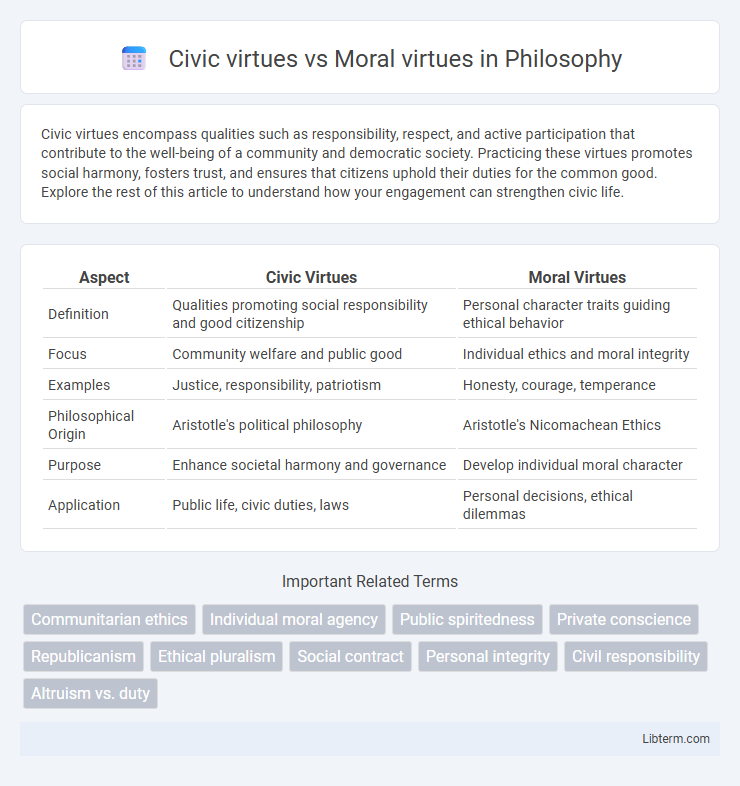Civic virtues encompass qualities such as responsibility, respect, and active participation that contribute to the well-being of a community and democratic society. Practicing these virtues promotes social harmony, fosters trust, and ensures that citizens uphold their duties for the common good. Explore the rest of this article to understand how your engagement can strengthen civic life.
Table of Comparison
| Aspect | Civic Virtues | Moral Virtues |
|---|---|---|
| Definition | Qualities promoting social responsibility and good citizenship | Personal character traits guiding ethical behavior |
| Focus | Community welfare and public good | Individual ethics and moral integrity |
| Examples | Justice, responsibility, patriotism | Honesty, courage, temperance |
| Philosophical Origin | Aristotle's political philosophy | Aristotle's Nicomachean Ethics |
| Purpose | Enhance societal harmony and governance | Develop individual moral character |
| Application | Public life, civic duties, laws | Personal decisions, ethical dilemmas |
Understanding Civic Virtues: Definition and Importance
Civic virtues encompass qualities like responsibility, participation, and respect for laws that enable individuals to contribute effectively to society and maintain social order. These virtues emphasize public-mindedness and active engagement in community affairs, distinguishing them from moral virtues, which focus on personal character traits such as honesty and compassion. Understanding civic virtues is essential for fostering sustainable democracies and promoting collective well-being.
What Are Moral Virtues? Fundamental Concepts
Moral virtues are character traits that guide individuals to act ethically, emphasizing qualities like honesty, courage, and compassion essential for personal integrity. These virtues form the foundation of moral character, shaping behavior that aligns with societal norms and ethical principles. Distinct from civic virtues, moral virtues focus on internal moral judgment rather than public or community responsibilities.
Key Differences Between Civic and Moral Virtues
Civic virtues emphasize active participation, responsibility, and commitment to the common good within a community or society, promoting behaviors like voting, obeying laws, and civic engagement. Moral virtues focus on personal character traits such as honesty, compassion, and integrity, guiding individuals to make ethical decisions and act with moral goodness. The key difference lies in civic virtues being oriented toward social and political life, while moral virtues are centered on individual ethical conduct and character development.
Historical Perspectives on Civic and Moral Virtues
Historical perspectives on civic virtues emphasize the role of active citizenship, public responsibility, and participation in governance as key to maintaining social order and promoting the common good. In contrast, moral virtues historically derive from philosophical and religious traditions, focusing on personal character traits such as honesty, temperance, and compassion that guide individual behavior. Classical thinkers like Aristotle distinguished between civic virtues necessary for effective citizenship and moral virtues essential for personal flourishing and ethical development.
The Role of Civic Virtues in Modern Democracies
Civic virtues such as political participation, respect for the rule of law, and public-spiritedness are fundamental to the functioning of modern democracies by promoting social cohesion and accountability. These virtues encourage citizens to actively engage in democratic processes, support institutional integrity, and uphold collective responsibilities beyond personal interests. Moral virtues, while essential for individual character, primarily govern personal behavior and ethical decision-making rather than direct political involvement and governance.
Moral Virtues in Personal and Social Life
Moral virtues, including honesty, compassion, and integrity, play a critical role in shaping both personal character and social interactions, fostering trust and empathy within communities. These virtues guide individuals to make ethical decisions that promote harmony and respect in diverse social environments. Cultivating moral virtues enhances social cohesion and personal growth by encouraging responsible behavior and mutual understanding.
Examples of Civic Virtues in Action
Civic virtues such as justice, responsibility, and patriotism manifest through community service, voting participation, and adherence to laws that uphold societal order. Examples include volunteering in local clean-ups, serving on jury duty, and engaging in peaceful protests to advocate for policy changes. These actions foster social cohesion and promote the common good by reinforcing citizens' roles in democratic governance.
Illustrative Cases of Moral Virtues
Moral virtues such as honesty, courage, and temperance are illustrated in cases where individuals consistently choose ethical behavior despite personal risk or sacrifice, exemplified by whistleblowers exposing corruption or activists standing against injustice. These virtues guide personal character and internal moral compass, contrasting with civic virtues that emphasize duties and responsibilities toward society and governance. Exemplifying moral virtues involves internal motivations and integrity, forming the foundation for ethical decision-making beyond social or legal obligations.
Civic Virtue vs Moral Virtue in Education
Civic virtues in education emphasize active participation, responsibility, and commitment to the community, fostering students' ability to contribute to democratic society. Moral virtues focus on personal character traits such as honesty, integrity, and compassion, guiding individual ethical behavior and decision-making. Integrating civic virtues with moral virtues in education develops well-rounded individuals capable of both ethical reasoning and social engagement.
Fostering Both Virtues for a Better Society
Fostering both civic virtues, such as justice, responsibility, and respect for the law, and moral virtues, including honesty, empathy, and integrity, is essential for building a cohesive and ethical society. Integrating these virtues encourages active citizenship and personal accountability, promoting social trust and collective well-being. Education systems and community programs play a pivotal role in cultivating these intertwined values to create informed, compassionate, and responsible individuals.
Civic virtues Infographic

 libterm.com
libterm.com